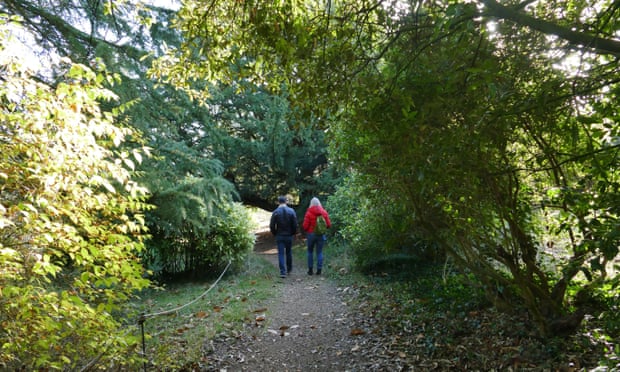11 Dec 2024

Tired Earth
By The Editorial Board

The government has pledged to increase tree planting to 30,000 hectares a year by 2024, but last year just 13,300 hectares were planted. Photograph: Geoffrey Swaine/Rex/Shutterstock
Walks taken by people in UK woodlands save £185m a year in mental health costs, according to a report.
Spending time in nature is known to boost mental health, but the report by Forest Research is the first to estimate the amount that woodlands save the NHS through fewer GP visits and prescriptions, reduced hospital and social service care, and the costs of lost days of work. The research also calculated that street trees in towns and cities cut an additional £16m a year from antidepressant costs.
The researchers believe the true savings are likely to be significantly higher. The report shows the importance of woodlands, they said, which the government is already aiming to expand to tackle the climate and wildlife crises.
The coronavirus pandemic has increased the prevalence of mental illness, and the NHS was already increasing its spending on treatments. This includes green social prescribing, where activities including nature visits are used to help sufferers. In polling by Forest Research, more than 90% of respondents said woodlands were important to them in reducing stress.
“If people spend 30 minutes a week in trees, doing whatever they like – walking, sitting meditating – there are noticeable benefits,” said Vadim Saraev at Forest Research. “It’s amazing how small that is in terms of time. You will feel much better than if you spent the 30 minutes looking at social media.”
“After a couple of years of researching this, I really became a convert,” he said. “When you walk through woods, it’s always different. It also feels fresher there, the air is less polluted and you are totally cut off from traffic noise. At the moment, if you pay a little attention, you will notice the rustling of leaves and interesting musty smells of wet earth and wood.”
Sir William Worsley, the chair of the Forestry Commission, which funded the report, said: “It demonstrates just how vital it is to invest in healthy trees and woodlands.” It makes medical, economic and environmental sense, he said.
The government has committed to ramping up tree planting to 30,000 hectares (74,100 acres) a year by 2024, but last year just 13,300 hectares were planted. The Woodland Trust warned recently that the UK’s native woodlands are reaching a crisis point, with just 7% in good condition.
“Forest Research have been leading the way in terms of estimating the economic values of the hard-to-measure health and wellbeing benefits of woodlands and forests for some years and this report adds further important new insights,” said Mathew White at the University of Vienna in Austria. “It would be great in the future if the team could estimate the effects of different types of woodlands, eg conifer plantations versus old deciduous woodlands, given the clear implications for forest management.”
Alistair Maltby, at the Woodland Trust, said: “If we want to maximise the benefits for people and society, we need more trees and woods that are both closer and more accessible. We urge the government to set a legal target for increasing tree cover.”
The Forest Research report uses evidence of reduced depression and anxiety as a result of regular nature visits, as well as data on woodland visitor numbers, and prevalence of mental health conditions and the associated costs.
The evidence included an Australian study, showing that visits to green spaces of 30 minutes or more during a week reduced overall rates of depression by 7%, and a UK study led by White that found a two-hour “dose” of nature a week significantly boosted wellbeing. The evidence on the benefits of street trees came from studies in the UK, the Netherlands and Germany.
The researchers said the calculated savings were based on conservative estimates of mental health costs. These only included NHS treatment, did not account for any illness prevented by woodland visits, and used the minimum living wage to calculate the value of lost work days, which accounted for about half the overall costs.
The estimated £185m cost savings are comparable to estimates of the value of all recreation, which the Office for National Statistics puts at £557m a year. Saraev said woodlands have value in their own right but that economic valuations aimed to make them relevant for policymakers: “If there is no value, it is not considered in decision making.”
Many people visit woodlands at least once a year, according to Forest Research surveys: 63% in England and about 80% in Scotland, Wales and Northern Ireland. More than a third of people in England and Northern Ireland visit at least several times a month, and half of those in Scotland.
“Although many of us feel like hibernating in winter, getting outside in green spaces and making the most of the little daylight we get can really benefit both your physical and mental health,” said Stephen Buckley at the mental health charity Mind.
Source : theguardian.com
Comment